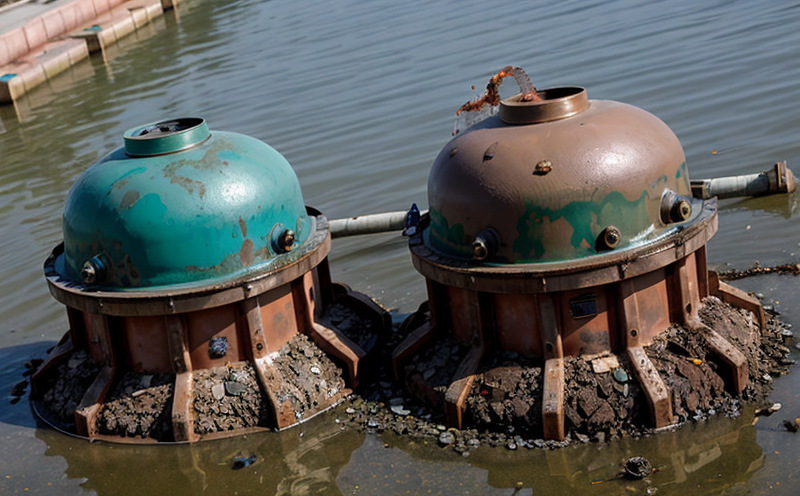ISO 7539-4 Stress Corrosion Testing by Four-Point Bending
The ISO 7539-4 stress corrosion cracking (SCC) testing method, known as the four-point bending test, is a critical tool in metallurgy and material science for assessing the susceptibility of metallic materials to stress-assisted failure. This test is particularly useful when evaluating how materials perform under combined mechanical load and corrosive environments. Stress corrosion cracking can occur in alloys that are exposed to specific environmental conditions such as high humidity or the presence of chloride ions.
The four-point bending test involves placing a specimen between two parallel supports, with a pair of loading points positioned at a distance from each other and from the supports. The test simulates real-world stress situations by applying a tensile load to the middle portion of the sample while exposing it to the corrosive medium.
The method is widely used in industries where materials are exposed to aggressive environments, such as aerospace, automotive, chemical processing, and maritime sectors. In these industries, understanding how materials will behave under stress-corrosion conditions can prevent costly failures and ensure product reliability.
Key parameters for the four-point bending test include:
- Test specimen dimensions
- Loading rate
- Environmental exposure duration
- Cross-sectional geometry of the sample
The results are analyzed to determine if and where cracking occurs, which helps in assessing the integrity and reliability of the material. This information is crucial for selecting appropriate materials for specific applications.
| Test Specimen Type | Environmental Conditions | Critical Crack Length |
|---|---|---|
| Austenitic Stainless Steel | High Humidity, Chloride Ions | >0.5 mm |
| Aluminum Alloys | Salt Spray Exposure | >1 mm |
The four-point bending test is recognized for its ability to provide detailed insights into the behavior of materials under combined mechanical and environmental stresses. The test can help identify potential issues early in the product development cycle, ensuring that materials meet stringent quality standards.
Industry Applications
The ISO 7539-4 four-point bending test is widely used across various industries where materials are subjected to mechanical stress and corrosive environments. Here are some specific applications:
- Aerospace: Evaluating fasteners, structural components, and engine parts for durability in high-stress environments.
- Automotive: Assessing the integrity of engine components, exhaust systems, and fuel lines under stress-corrosion conditions.
- Chemical Processing: Ensuring the reliability of piping systems, valves, and storage tanks that are exposed to corrosive chemicals.
- Mariitime: Testing hulls, propellers, and other components for resistance against saltwater corrosion and mechanical stresses.
The table below highlights key applications and environments where ISO 7539-4 testing is essential:
| Industry Sector | Key Applications | Critical Environmental Factors |
|---|---|---|
| Aerospace | Aircraft frames, fasteners | High humidity, salt fog |
| Automotive | Engine parts, exhaust systems | Chloride ions, high temperatures |
| Chemical Processing | Piping, storage tanks | Cleaning agents, acidic solutions |
| Mariitime | Hull plates, propellers | Salt water, marine biofouling |
By incorporating ISO 7539-4 testing into their quality control processes, industries can ensure that materials are not only strong under mechanical stress but also resistant to corrosion. This comprehensive approach enhances product reliability and safety.
International Acceptance and Recognition
The ISO 7539-4 four-point bending test is internationally recognized for its accuracy and reliability in assessing the susceptibility of materials to stress-assisted cracking under corrosive environments. This method is specified in several international standards, including:
- ISO 7539-4:2018
- ASTM E665
- EN ISO 7539-4
The widespread adoption of this test reflects its importance in ensuring that materials perform reliably under various environmental conditions. Compliance with these standards is crucial for industries operating globally, as it ensures uniformity and comparability of results across different jurisdictions.
Many organizations, including government regulatory bodies and industry associations, recognize the ISO 7539-4 test as a benchmark for quality control in metallurgy and material testing. This recognition underscores its role in maintaining high standards of product integrity and safety.
Competitive Advantage and Market Impact
The use of ISO 7539-4 four-point bending stress corrosion testing provides significant competitive advantages to companies operating in industries where material performance under combined mechanical and environmental stresses is critical. By implementing this test, organizations can:
- Enhance product reliability and safety
- Avoid costly recalls and warranty claims
- Develop more durable products that meet international standards
- Increase market share by ensuring compliance with global regulations
The test also allows companies to stay ahead of competitors by identifying potential issues early in the development process, thereby reducing time-to-market and improving overall product quality. In a highly competitive market, these advantages can translate into increased customer satisfaction and brand loyalty.
Furthermore, adherence to international standards like ISO 7539-4 enhances a company's reputation as a leader in quality control and material science, which is particularly important for gaining trust from clients and regulators.





